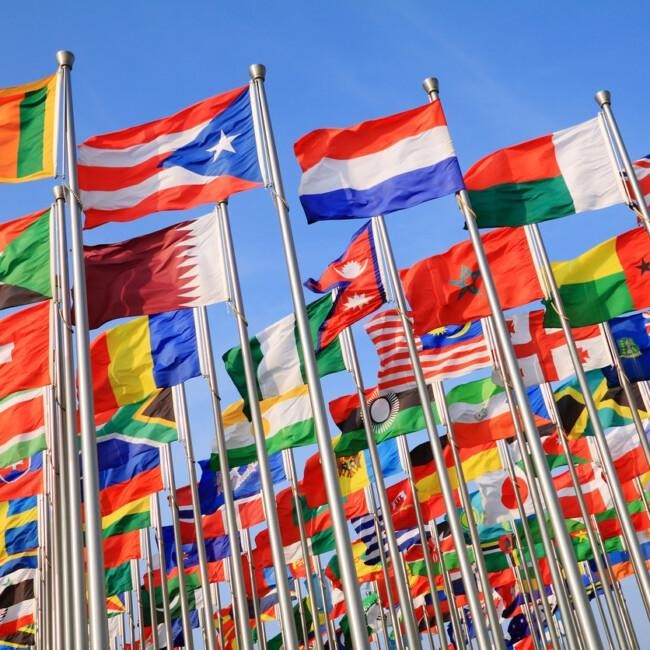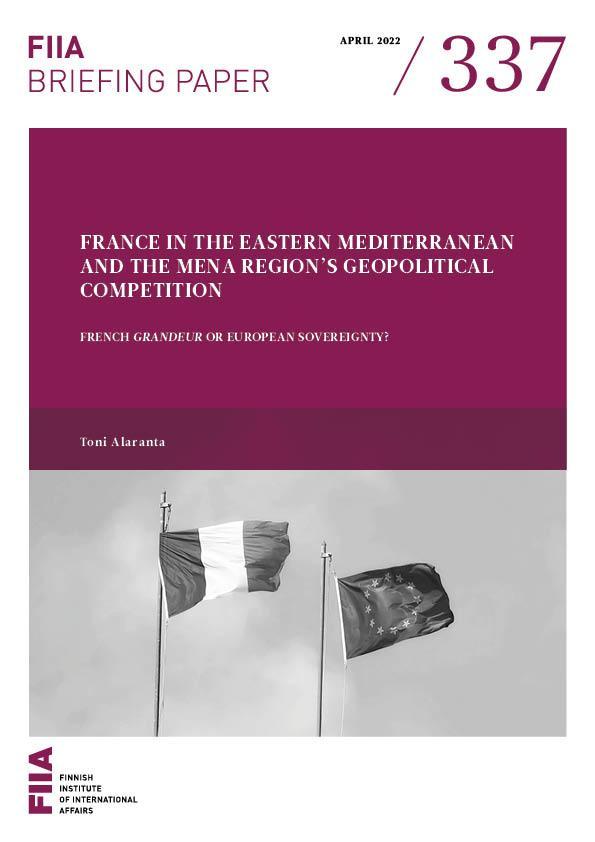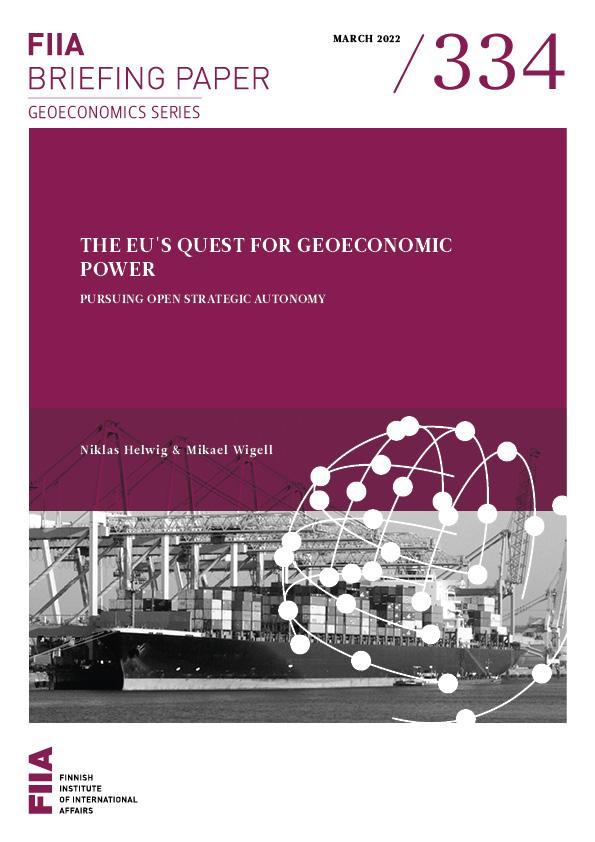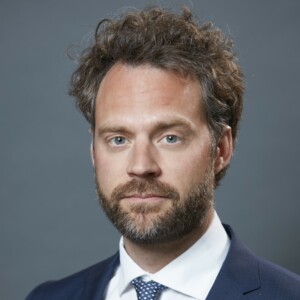
The war in Ukraine and the long-term consequences of the Covid-19 pandemic have put the spotlight on important political developments in the three largest EU members, Germany, France and Italy.
In Germany, the new coalition government led by Olaf Scholz is trying to adapt the country’s foreign, energy and fiscal policies to the new international scenario, relinquishing some of its long-term tenets.
France has just re-elected Emmanuel Macron as President, who is likely to advocate more flexibility in EU fiscal rules and strategic autonomy in foreign, defence and energy policy.
Mario Draghi’s government has attempted to steer Italy out of the economic and health crisis and has sought closer cooperation with France. Italy will hold a general election by June 2023, with four parties vying for pre-eminence.
In the wake of Brexit, Berlin, Paris and Rome have tried to revive the integration process. In the near future, it is expected that they will continue to drive EU politics, even if sometimes with different priorities, in close consultation with European partners.
Introduction
The European Union is facing the simultaneous challenges of the war in Ukraine, the ensuing humanitarian crisis, and an economic crisis caused primarily by high energy prices. Within the EU, the war has had profound consequences for Eastern members such as Poland and Romania, which have received by far the largest share of refugees.
The conflict and its consequences are unfolding against a pre-existing background that is far from rosy for the EU. The Covid-19 pandemic has been alleviated by mass vaccination, but is still not over. In 2021, the EU economy partly recovered from the Covid-related slump, but growth will most likely slow in 2022 due to the war and the energy crisis.[1] Current plans to diversify away from Russian fossil fuels and to increase military budgets imply a difficult reallocation of available resources.
Moreover, several long-term problems may become central again in the near future. These include diverse issues such as the destabilisation of the Middle East and North Africa and the related humanitarian crisis, breaches of the rule of law and rising illiberalism within the EU, in Hungary and in Poland in particular, and tensions concerning post-Brexit negotiations with the United Kingdom. The relationship with China, a key trade partner, is also becoming more problematic in the current scenario of rising great-power competition.
This volatile context also affects the domestic politics of EU member states. The three largest EU members in terms of population and economy have just experienced important political changes or are about to hold general elections. In Germany, a new government was formed in December 2021 under the leadership of Social Democrat Olaf Scholz, after 16 years of cabinets led by Angela Merkel. France has just elected Emmanuel Macron for a second presidential term, following a campaign in which far-right candidate Marine Le Pen – Macron’s contender in the second round of the election – also played a central role. In Italy, the political scenario remains uncertain as the country approaches the campaign for the next general election, which is to be held no later than 1 June 2023. Meanwhile, the broad coalition government led by Mario Draghi has tried to navigate the country out of the Covid-19 and economic crises.
This Briefing Paper examines recent key developments in Berlin, Paris and Rome. It assesses how current crises have affected such developments and discusses their impact on the priorities of and political dynamics among the three countries in the European Union. The paper argues that the domestic political course of Germany, France and Italy and the way these three founding EU members interact with one another are of central importance to EU politics. The larger EU members often provide leadership and political direction to address the main challenges facing the Union, and are likely to continue to do so in the foreseeable future.
The new German government: The European Zeitenwende
Germany’s political course was crucially influenced by the Bundestag election of September 2021. Due to the increasing fragmentation of the German political landscape, the election proved to be a highly contested one, with the Social Democratic Party (SPD) gaining a narrow victory over the centre-right Christian Union (CDU/CSU), which slumped to the worst result in its history. In December 2021, an unprecedented coalition of the SPD, the Greens and the liberal Free Democratic Party (FDP) was formed, with SPD candidate Olaf Scholz as the new Chancellor.
All three parties were able to include key electoral promises in the coalition agreement, but the document also reflects their disparate aims and ambitions. The key conundrum lies in the willingness of the SPD and the Greens to invest more in social and green projects, whereas the FDP – whose leader Christian Lindner took over the Federal Finance Ministry – wants Germany to reintroduce the so-called debt brake by 2023 and not to increase taxes. The debt brake, which limits public borrowing at the federal level to 0.35% of GDP, is enshrined in the German constitution, but has been temporarily suspended due to the Covid-19 pandemic. The government has been looking for ways to work around the brake, for example by redirecting credit appropriations initially designated for Covid-19 stimulus to its Climate and Transformation Fund.
A similar approach is visible in EU-level financial matters. Overall, the government seems willing to continue the fiscally conservative course of the Merkel years. However, during the pandemic, Berlin also opted for additional spending and government intervention. Scholz has highlighted the in-built flexibility of the Stability and Growth Pact (SGP), with the fiscal rules of the Eurozone on ice until the end of 2022. He also emphasised this flexibility on his first visits as Chancellor to Rome and Paris, which favour a more expansive fiscal policy. At the same time, Germany appears reluctant to engage in a more comprehensive debate about reforming the SGP, let alone to discuss wider European Monetary Union reforms, such as the introduction of a joint fiscal capacity.
The Russian attack on Ukraine has been an important test for Scholz’s government. The war has led Berlin to rethink its cooperative approach to Russia, and German foreign and security policy more broadly. Chancellor Scholz called the Russian attack a historic turning point (Zeitenwende) for Europe. He declared that Germany, known for its military restraint, would provide weapons to Ukraine, create a €100 billion special fund for modernising its armed forces and henceforth spend 2% of its GDP on defence, as agreed within NATO. He also announced Germany’s support for wide-ranging sanctions against Russia and the intention to reduce its dependency on Russian energy. These steps go against core tenets of the coalition parties, such as the SPD’s Ostpolitik tradition (aimed at cultivating close relations with Russia), the pacifist undercurrents within both the SPD and the Greens, and the frugal reflexes of the FDP. So far, the government has been able to close ranks and count on public support. However, tensions have been rising within the coalition of late, with critics at home and abroad demanding that Germany should play a more visible role in confronting Russia and supporting Ukraine.
One of the government’s most challenging projects will be reducing Germany’s energy dependency on Russian fossil fuels, including gas, which makes up roughly half of Germany’s total gas imports. The 2011 decision to phase out nuclear energy heightened Germany’s dependence on gas, which supplies German industry and accounts for roughly a quarter of Germany’s private energy consumption. Just before the war started, Germany halted the Nord Stream 2 project, which would have deepened the German-Russian energy relationship. Following Russia’s attack on Ukraine, Minister for Economic Affairs Robert Habeck suggested an ambitious timeline for reducing energy supplies from Russia, limiting the Russian share of gas imports to 10% by the summer of 2024. The government aims to achieve this by accelerating the transition to renewable energy and diversifying its supplies, in particular through liquefied natural gas (LNG) imports. However, LNG is on average more expensive than supplies piped from Russia, and the construction of Germany’s first LNG terminals will take years.[2] Meanwhile, Berlin has declined calls to ban energy imports from Russia altogether, or to rethink its phasing out of nuclear energy, which is due to be completed this year.
France: War and economic challenges for Macron’s second term
France has just held a presidential election that saw the electorate split, in the first round, between centrist candidate Emmanuel Macron (who received 27.6% of the votes), far-right Marine Le Pen (23.4%), and left-wing Jean-Luc Mélenchon (22%). All of the other candidates received well under 10% of the votes. The election confirmed the decline of the two major political parties of the French Fifth Republic, the centre-left Socialist Party and the centre-right Republicans. The second and decisive round saw Macron defeat Le Pen with 58.5% of the votes – a considerable margin, but smaller than in 2017, when he received 66% of the votes.
Macron won the election on a platform focused on facilitating entrepreneurial initiative, security, the energy transition and a social contract balancing the interests of young and senior generations. In foreign, security and European politics, Macron’s programme emphasised higher military spending, societal resilience and ensuring Europe’s energy, technological and strategic autonomy. The document specifies that Europe can achieve strategic autonomy in defence by defining a common doctrine and by strengthening considerably the capabilities and coordination of European armed forces.[3]
Russia’s attack on Ukraine has shaken the French establishment, too. During his first mandate, Macron advocated restarting high-level dialogue between the EU and Russia, following the logic that confrontation was not in Europe’s interest. Before the Russian attack in February, the French President was arguably the most active EU leader in seeking a negotiated solution to the ongoing escalation. Since then, France has condemned Russia’s war and accused Moscow of committing war crimes in Ukraine, while simultaneously keeping diplomatic channels open to facilitate humanitarian operations.
At the same time, some French energy companies have so far retained their presence in Russia. Moreover, according to pre-election surveys, the cost of living and social protections were the voters’ main preoccupations. While France is less dependent on Russian energy than Germany, especially due to the important share of nuclear power in its energy mix, the Bank of France expects the conflict to have a significant impact on inflation and growth.[4] Macron will thus have to walk a fine line between the international conundrum posed by the war in Ukraine and domestic developments. The first, key domestic test will be on 12 and 19 June 2022, when France will hold elections for the National Assembly. Securing a majority in parliament is essential for Macron to implement his political agenda. Meanwhile, the Left is uniting forces, as highlighted by an agreement between Mélenchon and the Green Party in early May. According to some polls, a united Left coalition could receive as many votes as Macron’s party La République En Marche in the parliamentary election.[5]
At the EU level, Macron’s agenda could focus on additional fiscal flexibility and a push to delay the application of the SGP until after 2023. On the other hand, the decision by several key EU partners to increase military spending could contribute to French plans to strengthen European defence and make Europe more ‘strategically autonomous’, even though the war in Ukraine has also underlined the continued significance of the transatlantic defence link.
Italy: Draghi’s government and the upcoming election
Italy has enjoyed relative domestic stability since the appointment of Mario Draghi as prime minister in February 2021. Draghi’s appointment was the result of a political impasse in the current Italian parliament, which was elected in 2018 and could no longer form a majority to support the previous prime minister, Giuseppe Conte of the Five Star Movement. Draghi presides over a broad coalition government including all major political parties except for the far-right Brothers of Italy.
Thanks to his role in managing the Eurozone crisis as president of the European Central Bank (2011–2019), Draghi is held in high esteem in the EU. This was a key factor behind the decision by most parties to support him as prime minister. Draghi is now administering Italy’s post-Covid recovery and resilience funds – €191.5 billion in loans and grants, the largest allocation to an EU member.
However, as the next general election approaches, disagreements have emerged in the governing coalition. In January 2022, the parliament could not find a majority to elect a new president of the Republic and eventually voted in the incumbent, Sergio Mattarella, for a second mandate despite his public pleas to find a successor. Meanwhile, most Italian political parties continue to see Draghi as a temporary, technocratic prime minister, whose primary task is to manage Covid-19 funds competently and steer Italy out of the health emergency. Political decisions that stray off this perceived mandate have caused disagreements in the broad coalition government. One such example is Draghi’s recent pledge to increase military spending to 2% of GDP by 2024 from approximately 1.4% in 2021, a decision on which most Italians disagree. Draghi seemed reluctant to allow substantial debate on this issue within the coalition.
The government will face increasing difficulties in the coming months. Gas and electricity costs rose by more than 50% in Italy during the winter. Like Germany, Italy is a large importer of Russian gas. Russia supplies around 40% of the country’s gas imports. While Italy also has pipeline connections to Algeria, Azerbaijan and Libya, as well as spare capacity in its three LNG import terminals, little gas is available on the market. The rise in the prices of energy, petrol and fertilisers is affecting the cost of basic consumer goods, resulting in mounting discontent.[6]
In the autumn at the latest, the campaign for the next general election will begin in earnest, in what is likely to be a tense political and societal context. Current opinion polls show four parties – the centre-left Democrats, the far-right nationalist Brothers of Italy, the far-right League and the eclectic Five Star Movement – competing for first place. Against this background, the Draghi government will continue to focus on domestic crisis management, while aligning with like-minded countries in the EU (France, Spain, Belgium, Portugal) in opposition to a quick reintroduction of SGP rules.
The Franco-German-Italian triangle amidst European and international challenges
Franco-German cooperation is broadly seen as the ‘motor’ of European integration. This is partly because of the sheer economic and political weight of Germany and France, but also because their differing approaches to key issues of European politics (i.e. economic and fiscal policy, energy, defence) tend to be broadly representative of the stances of other groups of member states. Arguably, the centrality of France and Germany to the European integration project has even increased after Brexit, as the United Kingdom was a highly influential member state in policy fields such as foreign affairs, defence, as well as trade and energy policy. This does not, however, mean that Berlin and Paris make decisions alone in the EU. Coalition building and the support or at least the consent of other members is essential on virtually all important issues. In the post-Brexit context, Italy has occasionally attempted to position itself as an ‘equal’ partner to France and Germany in the EU, drawing on its status as the third largest member, thus far with modest results only.
In the difficult aftermath of Brexit, France and Germany reaffirmed their willingness to cooperate bilaterally and drive European integration by signing the so-called Aachen Treaty in January 2019. Emblematically, the Treaty’s preamble refers to the 1963 Élysée Treaty, which established a framework for friendly relations after decades of rivalry and war. Most importantly, Article 1 of the Aachen Treaty states that Germany and France “shall deepen their cooperation on European policy”, “promote an effective and strong common foreign and security policy” and “strengthen and deepen the Economic and Monetary Union”.[7]
In the summer of 2020, Berlin and Paris initiated the €723 billion Recovery and Resilience Facility, which became the centrepiece of the NextGenEU Instrument and thus of the EU’s efforts to tackle the pandemic’s economic fallout. Some observers saw this as a decisive German shift towards a more flexible European fiscal policy, including the option of joint EU borrowing in certain circumstances. However, German officials have underlined time and again that the instrument is temporary and issue-based. The decision on whether and how to reintroduce the fiscal rules of the SGP in early 2023 is an issue on which Germany and France appear to have different positions and could be a test for Franco-German cooperation in the coming months.
Berlin and Paris have taken a leading role on a number of foreign policy issues, such as negotiations on the Ukraine crisis between 2014 and 2021, negotiations on Iran’s nuclear programme and several European foreign policy initiatives concerning the Western Balkans. While in some contexts France and Germany have been the only representatives of the EU at the negotiating table (most notably, in the Normandy format on the Ukraine crisis), the consent and support of other member states is usually important for Franco-German diplomacy. This emerged most clearly in June 2021 when the Franco-German proposal to hold a summit with Russian President Vladimir Putin was rejected by several other member states and failed to come to fruition.[8]
Italy’s recent attempts to strengthen its position within the EU have taken the form of closer bilateral cooperation with Germany, and especially France. With France, this process led to the signing of a treaty on ‘enhanced cooperation’ in November 2021, also named the ‘Quirinale Treaty’ (after the residence of the Italian President of the Republic). The treaty created a framework for interactions at multiple levels of government, with the goal of boosting bilateral ties and the standing of both countries in Europe. France and Italy have similar positions on key issues such as reviewing the Eurozone governance system and allowing for a more expansionary fiscal policy.
This was also highlighted by Draghi and Macron’s joint op-ed published in December 2021, where they defined existing EU fiscal rules as ‘obscure and excessively complex’. While arguing that the EU should reduce its levels of indebtedness, they stated that this cannot be done through ‘unviable fiscal adjustment’ and called for further ‘large-scale investment in research, infrastructure, digitisation and defence’.[9] By coordinating on this issue, France and Italy can potentially boost their leverage vis-à-vis Germany and other ‘frugal’ members (i.e. the Netherlands, Austria, and Nordic countries), and also channel the position of like-minded Southern members. Strategic autonomy also plays an important role in the Quirinale Treaty, which highlights the Franco-Italian convergence of views on the matter.[10]
At the same time, the relationship with Berlin is at least as important for both Paris and Rome. France continues to consider Berlin its most important European interlocutor on most issues. In Italy, the signing of the Quirinale Treaty was followed by a visit by new German foreign minister Annalena Baebock in January 2022 and unofficial talk about an upcoming German-Italian treaty.
Yet growing international tensions currently leave little room for formalising bilateral cooperation. The war in Ukraine and growing US-China competition are urging Berlin, Paris and Rome to coordinate with all other EU members in order to navigate the crises. In 2019, Macron had described NATO as ‘brain dead’ and called for more strategic autonomy for the EU, drawing criticism from the staunchly Atlanticist member states, especially the Baltics and Poland, but also from Germany. The war in Ukraine has aligned member states’ views on the need for close cooperation with the US on security matters for now.
EU relations with China, another central issue due to increasing great-power competition, remain complex. While the recently published EU Strategic Compass does not shy away from outlining the Chinese threat potential, member states' economic dependence on China and the need to cooperate on global issues such as climate change limit their ability to confront Beijing on security and human rights matters. With the change of government, Germany’s ‘value-based’ China policy became somewhat more aligned with that of France, as Berlin vowed to pay additional attention to human rights concerns. Germany’s economic and industrial policy has also become more cautious of exposure to Chinese trade and investment, leaving more room for close Franco-German cooperation to protect and strengthen the European economic and industrial base.
Conclusion
Important domestic developments and foreign policy shifts have taken place in the three larger EU member states, which may also affect the future direction of EU politics. Global strategic competition has pushed France, Germany and Italy closer together and aligned some aspects of their economic and security policy. The war in Ukraine has led them to take a much more critical approach to Russia and adopt unprecedented sanctions. However, domestic dynamics and different stances on EU-level issues persist. Hence, Berlin, Paris and Rome do not always act in unison. Following Macron’s re-election, France and Italy are likely to pursue a more flexible and expansive fiscal policy, whereas Germany prefers to reintroduce SGP rules and use the flexibility allowed within the treaty.
The three countries continue to be key drivers of European policymaking. At the same time, they cannot make decisions without considering the positions of other member states. Any effort towards a leading role for France, Germany and Italy has to take into account the complex dynamics of today’s EU politics. Issue-based coalitions, such as the aforementioned group of ‘frugals’, have grown in importance. Therefore, the politics of an EU of 27 members cannot be captured solely by examining the dynamics and agreements of its largest members.
Nonetheless, the analysis of domestic developments in France, Germany and Italy, as well as of their stance on key European debates, provides important insights into the general direction of EU politics. Questions such as fiscal policy, the energy transition and foreign and security policy, including Europe’s strategic autonomy, are expected to take centre stage in the near future. The executives that recently came into office in Berlin and Paris have highlighted the centrality of these issues. While Italy will hold a new general election within a year, the next government is unlikely to stray off this agenda significantly. Therefore, the three countries can be expected to continue driving EU politics, even if sometimes with different priorities, in close consultation with other European partners and coalitions of member states.
Endnotes
[1] European Commission, Winter 2022 Economic Forecast, 10 February 2022, https://ec.europa.eu/commission/presscorner/detail/en/ip_22_926.
[2] German Ministry of the Economy and Climate Protection, 25 March 2022, https://www.bmwi.de/Redaktion/DE/Downloads/Energie/0325_fortschrittsbericht_energiesicherheit.pdf?__blob=publicationFile&v=10; Bloomberg, “Germany faces reckoning for relying on Putin for cheap energy”, 5 March 2022, https://www.bloomberg.com/news/articles/2022-03-05/germany-faces-reckoning-for-relying-on-putin-for-cheap-energy.
[3] “Emmanuel Macron Avec Vous”, 2022 Election Programme, March 2022, https://avecvous.fr//data/wordpress/htdocs/wp-content/uploads/2022/03/Emmanuel-Macron-Avec-Vous-24-pages.pdf; see pp. 4, 5 and 23.
[4] Banque de France, Projections macroéconomiques – March 2022, https://publications.banque-france.fr/projections-macroeconomiques-mars-2022.
[5] France24, “French Greens, leftist Mélenchon form alliance ahead of parliamentary elections”, 2 May 2022, https://www.france24.com/en/europe/20220502-french-greens-far-left-leader-m%C3%A9lenchon-form-an-alliance-ahead-of-parliamentary-elections.
[6] F. Sassi, “Diplomazia energetica italiana”, Energia, 5 March 2022, https://www.rivistaenergia.it/2022/03/diplomazia-energetica-italiana-alla-prova-1-algeria-e-libia/.
[7] Treaty between the French Republic and the Federal Republic of Germany on French-German Cooperation, 22 January 2019, https://www.diplomatie.gouv.fr/IMG/pdf/19-0232-1900417_en_fin_reinschrift_ws_aa105-og_ck_010219__cle079d7b.pdf.
[8] “EU leaders reject France, Germany's proposal for Putin summit”, France24, 25 June 2021, https://www.france24.com/en/europe/20210625-eu-leaders-reject-france-germany-proposal-for-summit-with-putin.
[9] M. Draghi and E. Macron, “The EU’s fiscal rules must be reformed”, Financial Times, 23 December 2021, https://www.ft.com/content/ecbdd1ad-fcb0-4908-a29a-5a3e14185966.
[10] Traité entre la République italienne et la République française pour une coopération bilatérale renforcée, 26 November 2021, https://www.governo.it/sites/governo.it/files/Traite_bilateral_franco_italien.pdf; M. Freyrie, “Dreieck statt Achse”, Tageszeitung, 23 February 2022, https://taz.de/Deutsch-italienische-Zusammenarbeit/!5830221/.












